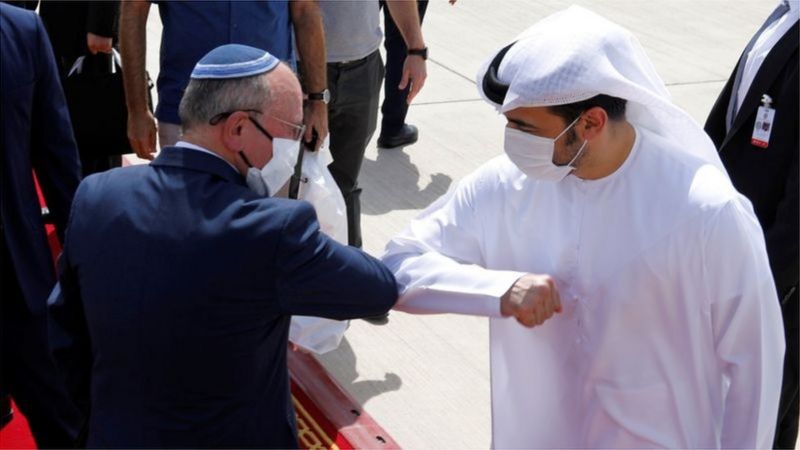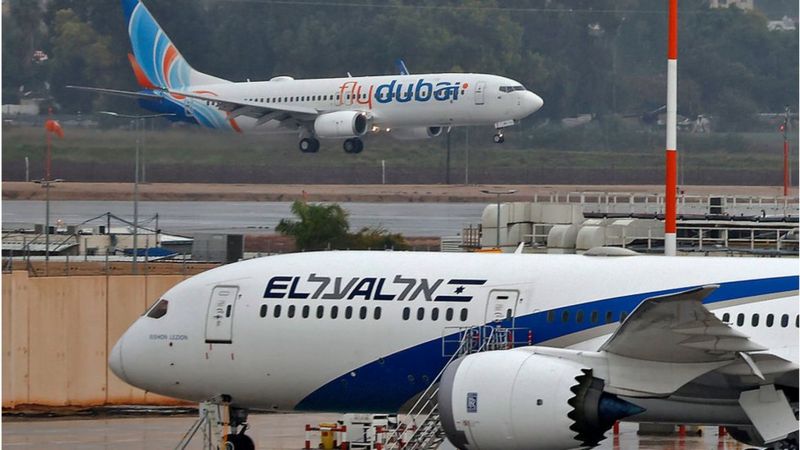
*Moazzem Hossain
Publish: 28 Nov 2020, 02:43 pm

What is the main purpose of the restrictions imposed by the UAE on the issuance of visas to citizens of 13 major Muslim-majority countries?
The ban, imposed by the United Arab Emirates, comes at a time when Israel has established direct air links with the country on Thursday.
The first flight of ‘Fly-Dubai’ Airlines from Dubai flew to Tel Aviv on Thursday. It was welcomed by Israeli Prime Minister Benjamin Netanyahu. This is the first direct commercial flight of its kind since normal diplomatic relations were established between the two countries.
On the same day the flight began, Reuters reported that UAE visa restrictions for citizens of 13 countries were being applied not only to travel visas, but also to employment visas.
These 13 countries include: Iran, Turkey, Syria, Somalia, Algeria, Kenya, Iraq, Lebanon, Pakistan, Tunisia, Afghanistan, Libya and Yemen. Of these, every country except Kenya has a Muslim majority. Some countries have very friendly relations with Iran.
They did not say why the UAE imposed the ban. So there is a lot of speculation about it.
Many of the people against whom sanctions have been imposed work in the UAE. Especially in Pakistan, Iran, Syria, Lebanon and Afghanistan.

Many fear that the UAE's normal relations with Israel could spark renewed tensions in the Middle East.
Some security analysts speculate that security concerns may be at work, especially after the recent attack on the French embassy in Saudi Arabia. But many do not agree with this argument, because one Saudi citizen was involved in the attack. However, sanctions have been imposed on all countries, most of which are known to be close allies of Iran or with which Iran has significant ties.
Not only that, 11 of these 13 countries have criticized the normalization of the UAE's relations with Israel. Some countries speak quite strongly.
What does the UAE's (UAE) sanctions against 13 countries have to do with normalizing their relations with Israel?
Retired Major General Muniruzzaman, an analyst on international terrorism and security, thinks there is reason to suspect this.
In an interview with BBC Bangla, he said, "Terrorism may be a major problem in some of these 13 countries. But at the same time, there are a few countries where terrorism is not a big problem. But none of these countries are favored by Israel."
"We know that the UAE has recently established relations with Israel. So the question of whether Israel has any influence behind the sanctions is on the minds of many analysts. But it is not clear yet."
Security or politics?

(Photo: Collected) (Flydubai's first direct flight has landed at Tel Aviv airport)
Could the reason for the ban be that they have criticized the UAE for establishing normal relations with Israel?
General Muniruzzaman said, "Many people think that Israel has an influence or hand behind this decision. Since the UAE recently established relations with Israel, their relations have been deepening very rapidly. In this case, It is possible that sanctions are being imposed on them, but it is not possible to say for sure. "
The UAE has not only established diplomatic relations with Israel. At the same time, they are moving towards cooperation in aviation, tourism, security, trade and commerce, and for citizens of the two countries to travel to each other's countries without visas.
Could Israel have made such a request to the UAE out of concern for their security?
General Muniruzzaman said that it would not be right to think that the UAE's relationship with Israel has developed suddenly. Israel has been working behind the scenes for a long time, and Israel has moved forward with a lot of security risks. Maybe the UAE is trying to create such a visa system by fully analyzing them.
"Israel thinks that if it succeeds in its relations with the UAE, it will be able to attract other Muslim countries, especially if it is successful in the economic field. "I believe they have made this decision after analyzing their security risks."

Many believe that Iran is a major factor in the UAE's travel ban. These countries either have significant strategic interests in Iran, or have good cooperative relations with them. Or there are significant numbers of Shia Muslims in these countries.
On the other hand, Iran's relations with both the United Arab Emirates and Israel are very hostile. Is this also a reason for the ban?
General Muniruzzaman says he cannot rule out the idea that Iran is at the center of the decision.

(Security analyst retired Major General Muniruzzaman)
"If you look at the list of these countries, you will see that these countries have relations with Iran. In many cases, they continue to communicate and trade with them. So it would not be wrong in our analysis to think that Iran is a factor. It's always been working. Wherever possible, they're doing it in one room. "
However, Bangladesh is not on the list of these 13 countries in the UAE, although a large number of Bangladeshis work there.
General Muniruzzaman said he was not surprised that Bangladesh was not on the list.
"Bangladesh has not been on the list in recent times in terms of the type of terrorist activity that is considered a security risk. In addition, Bangladesh's current relationship with Iran is not very deep. However, it is not surprising that Bangladesh is not on the list. "
General Muniruzzaman said, "The Bangladeshis who are currently working in the UAE have a good reputation. From that point of view, I am not too surprised that Bangladesh is not on the list."
*The writer works at BBC Bangla
Source: BBC Bangla
Subscribe Shampratik Deshkal Youtube Channel
Topic : Others
© 2024 Shampratik Deshkal All Rights Reserved. Design & Developed By Root Soft Bangladesh